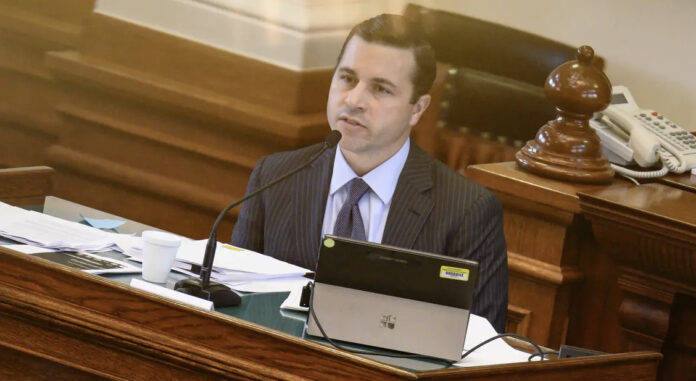A whistleblower’s comment that he and his associates “took no evidence” when they reported Ken Paxton to the FBI has turned into an early flashpoint in the attorney general’s impeachment trial.
The comment Thursday from Ryan Vassar set off jubilation among Paxton supporters and prompted a House lawyer, Rusty Hardin, to coach Vassar through a clarification Friday.
Vassar said he meant physical evidence, and Hardin asserted that Vassar going to the FBI was inherently a form of evidence because he was a witness to a potential crime.
Vassar, the former deputy attorney general for legal counsel, was among the top Paxton aides who went to the FBI in October 2020 to share concerns that Paxton was abusing his office to help Nate Paul, an Austin real estate investor and Paxton campaign donor. The articles of impeachment accuse Paxton of going to extraordinary lengths to help Paul investigate his perceived enemies as his businesses were floundering.
Cross examining Vassar on the witness stand Thursday afternoon, Paxton lawyer Mitch Little zeroed in on the decisions the whistleblowers made before reporting Paxton to the FBI. As part of that, he pointedly asked Vassar: “I want to get this straight: You went to the FBI on Sept. 30 with your compatriots and reported the elected attorney general of this state for a crime without any evidence, yes?”
“That’s right,” a stone-faced Vassar replied. “We took no evidence.”
Little paused for dramatic effect.
Vassar had previously disputed the premise of the line of questioning — that the whistleblowers would be expected to bring evidence to the FBI to report their concerns. But his “no evidence” comment quickly took on a life of its own, giving pro-Paxton forces an opening after a trial that began Tuesday with a barrage of setbacks as senators rejected all of Paxton’s pretrial motions to dismiss the articles of impeachment.
“BOMBSHELL: Lead ‘Whistleblower’ In AG Ken Paxton Impeachment ADMITS No Evidence Submitted To FBI,” the pro-Paxton Conservative Political Action Conference tweeted.
“Their entire case is falling apart,” Jonathan Stickland, the head of a pro-Paxton group, said Friday on Steve Bannon’s “War Room” podcast. “We have witnesses come up and say, ‘Yeah, I went to the FBI with absolutely no evidence.'”
After the trial wrapped up Thursday, Paxton’s lead attorney, Tony Buzbee, took to Instagram to share a screenshot of the definition of “bogus,” including an example sentence saying, “The evidence was completely bogus.”
On Friday, Vassar began clarifying the comment, first under more questioning from Little and then under examination by Hardin. Vassar said he meant the whistleblowers took no “documentary evidence” to the FBI, and Hardin coaxed Vassar to say he was providing a form of evidence by presenting himself as a witness to potential crime.
“Did you take your body? Did you take your voice? Did you take your brain? Did you take your experience? Did you take your knowledge of the last nine months?” Hardin asked Vassar, who responded yes each time. “Do you realize in the legal world that is evidence?”
Hardin then asked Vassar what is his “opinion now after the primer we just did.”
“My opinion was that our experiences were evidence, but we did not take our own investigation to provide documentary evidence of what we had come to learn,” Vassar said.
Vassar later added that he did not see his role as an investigator. “I believed that I was a witness to criminal activity that had occurred by General Paxton.”
Vassar was the third witness to testify in the historic trial. All of the witnesses so far have been called by House impeachment lawyers and all three were whistleblowers who reported Paxton to the FBI. Two of the witnesses were among the whistleblowers who also filed a lawsuit accusing Paxton of firing them in retaliation.
Vassar’s testimony has perhaps drawn the most attention among Paxton’s supporters. Vassar began his testimony Thursday by tearing up on the stand when asked about Paxton dismissing the whistleblowers as “rogue employees.” One prominent Paxton supporter, Michael Quinn Sullivan, has seized on the moment to ridicule Vassar as “Crying Man” on Twitter.
Little, Paxton’s lawyer, was unsympathetic Friday as he invoked Vassar’s crying while reading off texts in which the whistleblowers denigrated Paxton employees they were leaving behind. Little said Vassar had been upset about being called rogue but suggested he had little problem making fun of his colleagues.
“It was lighthearted,” Vassar said, “It was among friends. It was not made public to millions of people.”
On Friday, Little otherwise continued to question Vassar over a major focus of Paxton’s side: the whistleblowers’ use of an official letterhead without Paxton’s name. Paxton’s lawyers have suggested the whistleblowers removed Paxton’s name from the letterhead and broke a law against altering a government document.
Vassar denied that, saying “there are different seals for different purposes, and in this situation, we used the seal without General Paxton’s name on it.”
Hardin had tried to get Vassar to call the allegation a “lie,” but he only called it “not true.” That prompted Hardin to extoll Vassar’s graciousness with adjectives the combative Little used Thursday to praise Paxton as a boss.
“You are indeed, Mr. Vassar, a kind and gentle person,” Hardin said, “so much so that after yelling and constant interruption, you still don’t like to use the word ‘lie,’ do you?”
This article originally appeared in The Texas Tribune.







